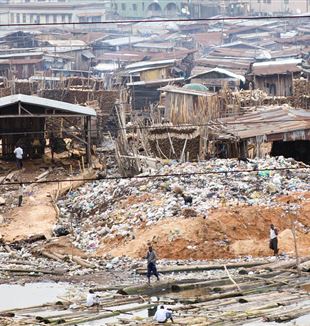
Faithful to the End
After the death of his parents, he was alone with four younger siblings to raise. His encounter with the friends in the Movement who helped him continue his studies. A full life until January 27th.Fidelis lived with his family in the Maroko slum of Lagos, in Nigeria. In 1988, in high school, he met a little group of people who proposed he meet with them to talk about life and share a new and little-known experience: that of the Movement of CL, which was starting up also in Nigeria through the girls in the Memores Domini house. He immediately adhered to that initial Gioventù Studentesca (Student Youth) group. From there he went on to attend School of Community and to become involved in charitable work, afternoon study sessions, and evenings in their company. In 1990 the Maroko neighborhood was torn down, and not long after that, his parents died. He was left alone, without sufficient means for survival and with four younger siblings to raise. He still had his dream of further studies, but how? Some relatives near Makurdi (about ten hours’ drive from Lagos) took in his little brother and three sisters. His friends decided to help him with a scholarship, so Fidelis could enroll in the Faculty of Communications at the University of Makurdi. If it hadn’t been for those friends… But even so far away from them, he was not alone; he involved others in a new School of Community, even a faculty member, Josephine. A couple of times a year the communities of Lagos and Makurdi managed to meet all together.
In 1997, he finished his university studies. He returned to Lagos and found space in an apartment with other young people on the staff of the St. Kizito Clinic. Between one job and another he decided to continue studying, and enrolled in the Faculty of Law at the University of Lagos. But he was not the sort of person to keep his nose always buried in a book; he was an excellent choir member and a lively presence in the parish and among the university students. Above all, he was a great musician on the drums and guitar. He was a friend who would draw you into things, could make you laugh with his jokes and games, and was one to whom you liked to listen.
But there was always that concern for his brother and sisters who had grown up in the meantime but were not yet self-supporting. They still lived with their relatives in the village three hours away from Makurdi, but Fidelis could not contribute very much to their support (it was already hard for him to support himself). Before Christmas 2000, he decided to go to see them. “You never go to the village empty-handed,” he kept saying, and so he got together some gifts for his brother and sisters. Fidelis had now to organize the trip, which was a hard and long one. Joy, a new friend who had come from Makurdi to Lagos to work and continue her studies–instead of being offered as a third wife to take some of the financial burden off her family–wanted to go home for Christmas as well. In the end, however, they decided to depart on different dates. Fidelis left on December 27th. His return to Lagos was set for January 3rd, when university classes would start again.
But Fidelis did not arrive on January 3rd. Nor did he arrive a week later with Joy. No one could find news of him. At the bus station, they discovered that the December 27th bus for Makurdi had had a wreck. For three more days they knew nothing more. News was vague, not even revealing the precise place of the accident or the condition of the passengers. Three days of prayer. Then the news came: six people had died in that accident. Everything came to a halt in the little community of Lagos–study, work, and preparations for the 50th birthday party for Gabriella (one of the Memores Domini in Lagos). Finally, the tragic confirmation arrived that Fidelis had died in the accident. “What are you asking of us with what happened? In what way do you want us to change?” This is what his friends ask, unable to find an answer to their great, stunned grief. “What do you ask of us?” is like saying, “What is its meaning?” This grief has to have some meaning.
Fidelis, who died instantly, had in the meantime been buried there on the spot, because no one had “requested the body.” Drama on top of drama. His relatives and Josephine obtained permission to take Fidelis’s body to the village near Makurdi for proper burial, and laid him to rest in the back of a little woods, alongside his parents.
A great many people prayed for him in Lagos, Makurdi, and the village: the friends in the community, his university classmates, mere acquaintances. Even the Apostolic Nuncio made the nunciature chapel available to them, and the choir sang for him.
Messages to the friends in Nigeria arrived from Movement communities all over the world. Living tragedy in this way is a different matter.
Joy wrote to Chiara, who is in the Memores house in Lagos: “Just as it was for Enzo, Emilia, or Francis in Uganda, if the Lord allows this sacrifice, it is to make us more aware that He is the Lord.”